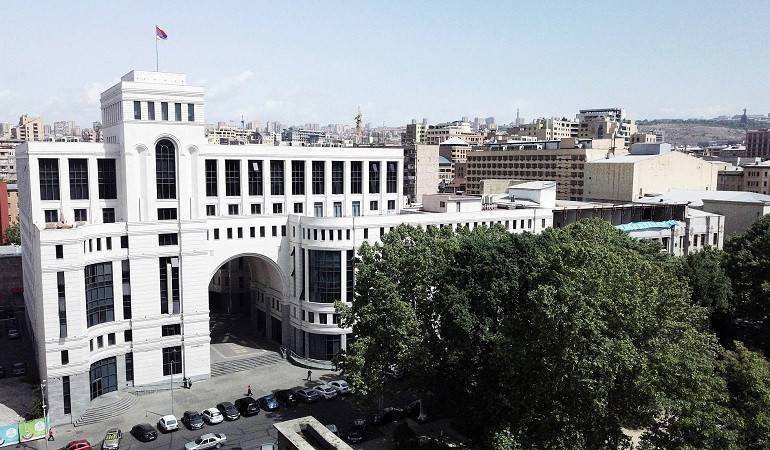The Armenian Foreign Ministry on July 3 responded to recent analysis by Olesya Vartanyan of the Carnegie Endowment for International Peace, which reported that the United States is advancing a new proposal to Armenia and Azerbaijan aimed at reopening regional transport routes in the South Caucasus.
In a statement, the Foreign Ministry noted that while it does not typically respond to unofficial, analytical publications such as Carnegie’s, it had provided a full response to media inquiries on the matter within 24 hours. The Ministry also criticized local outlet Azatutyun for implying that it had remained silent or passively agreed with the Carnegie report, calling the framing misleading.
Foreign Ministry spokesperson Ani Badalyan stated that the unblocking of transport infrastructure in the region “has been and remains an important priority” for Armenia. She reaffirmed Yerevan’s commitment to its own framework—the “Crossroads of Peace”—describing it as Armenia’s vision for regional connectivity.
“Armenia has proposed its vision for regional connectivity—the ‘Crossroads of Peace’—which has already received positive reactions from a number of international partners,” Badalyan said. She added that Yerevan has also presented a series of practical solutions in line with this initiative, aiming to ensure they are acceptable to all stakeholders.
Badalyan noted that multiple international partners—including the United States—are regularly engaged in discussions with Armenia, offering ideas related to normalization with Azerbaijan and the unblocking of regional transit routes. These discussions come against the backdrop of heightened tension, including Azerbaijan’s demand that Armenia amend its constitution, and follow what Armenian officials and international observers have described as a blockade and the ethnic cleansing of the indigenous Armenian population of Artsakh in 2023.
She emphasized that discussions remain ongoing with “all interested partners,” with the goal of achieving mutually beneficial results and realizing the region’s potential as a transportation hub.
While the Foreign Ministry did not specifically comment on the details of the U.S. proposal, Vartanyan’s report—based on unnamed diplomatic sources—suggests that Washington is actively promoting a new connectivity framework as an alternative to the so-called controversial “Zangezur Corridor” pushed by Azerbaijan and Turkey, which would link mainland Azerbaijan to its Nakhichevan exclave through Armenia’s southern Syunik region.
According to Carnegie, the U.S. proposal involves placing the transit route under the oversight of a U.S.-based commercial logistics operator responsible for managing cargo flow and data sharing with all sides. The model is designed to act as a neutral mechanism to reduce regional tensions, stabilize trade routes, and ensure transparency without undermining Armenia’s sovereignty. While the Carnegie analysis suggests Turkey could play a stabilizing role, many Armenian observers and experts have questioned Ankara’s neutrality given its longstanding military alliance with Baku—especially in light of its continued denial of the Armenian Genocide, its support for Azerbaijan’s military offensives, and its silence on Azerbaijani war crimes, including the illegal detention of Armenian prisoners of war and the ongoing imprisonment of Artsakh’s elected leaders following the 2023 ethnic cleansing.


